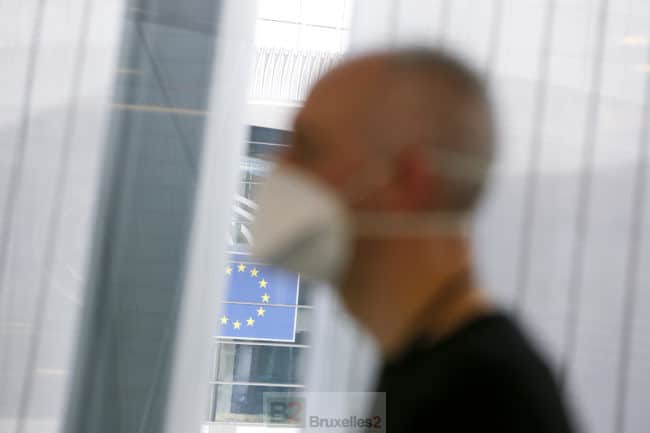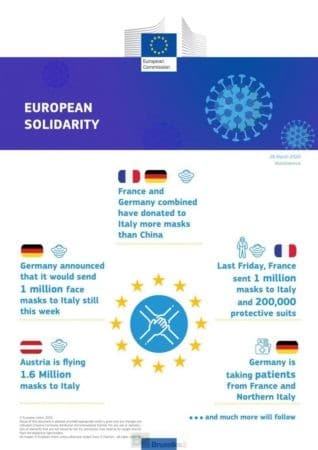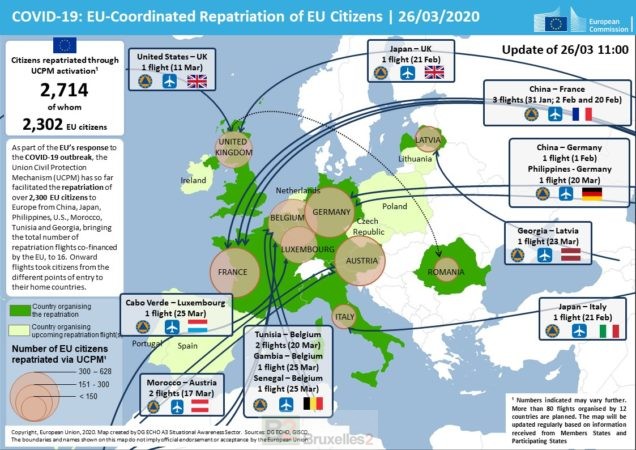Faced with the tragedy of the coronavirus, what is Europe doing concretely in crisis management?
(B2) Has the European Commission been able to respond to requests from Italy, Spain and other countries in distress? Not easy. Point

Following Thursday's editorial (read: Coronavirus crisis. The von der Leyen Commission lacks audacity. Congenital weakness?), I received a lot of reactions and requests for additional information, in particular on the concrete help of the European Union. I am not talking here about the regulatory measures to facilitate the internal market or the funding of laboratories to find a vaccine, I am talking here about the concrete emergency aid, in the event of disasters, for which the European Union has both the necessary legal bases (articles 122, 196 and 222 of the Treaty on the functioning of the EU for specialists) and budgets (see also: Faced with the Coronavirus, acting and being united is not a faculty, it is an obligation. Says the treaty).
A month later, what happened?
Almost a month after the first triggering of the crisis management system (IPCR and civil protection mechanism), the (concrete) aid from the European Commission, that is to say, men, materials, etc. essentially boils down to three things: masks, repatriation and the group purchase of additional equipment via the launch of calls for tenders.
Almost four million masks
Germany, France and Austria have sent nearly four million masks to Italy in all, as of January 26: 1 million masks this week for France (a week ago), Germany (at the end last week) and 1,5 million for Austria. In addition, France sent 200.000 protective suits. For a population of over 60 million, when masks have to be changed more than once a day, that's not a huge amount.
Less than 3.000 people repatriated
In terms of repatriation, as of March 26, according to official figures, 2.714 people have been repatriated, via the civil protection mechanism, including 2.302 European citizens. Most of the repatriations concern citizens stuck in China. Rather low figure, again in view of the crisis. To give an order of magnitude, the European diplomatic service estimated at around 300.000 the number of European citizens stuck outside their homes. For France, the number of compatriots abroad is estimated at 130.000, 110.000 have already been repatriated or have returned. (1)
Additional equipment to come
Finally, the European Union launched several joint calls for tenders in order to buy masks, respiratory masks, on February 28, March 17 and March 19 (or March 18 according to the versions given by the Commission) for various personal protection — ranging from goggles and respiratory masks, to laboratory equipment, etc. The contracts are in the process of being signed for some, for others it will be later. For the arrival of the material, it will be necessary to wait a little longer.
Comment: ...and that's it?
All of this is low, very low, given the magnitude of the crisis and the time that has passed since the alert that was given in early March.
Yet Europe was ready...
We are far from the response promised (end of January) by Stella Kyriakides, the European Commissioner in charge of health: “ We stand ready to support Member States and ensure a strong and coordinated EU response, outside and inside the European Union (2).
...and low epidemic spread globally
It is true that if we are to believe Commissioners Valdis Dombrovskis and Paolo Gentiloni (Economy), who on 13 February signed their winter economic forecast, their assumption in the baseline scenario was a peak in the epidemic "achieved in the first quarter" with a "relatively limited [...] global spread »
This is what is called a beautiful crash and perhaps explains the panic that reigns in the 'European Commission' house to point the finger at the States as solely responsible for this incompetence.
(Nicolas Gros-Verheyde)
Next: the regulation on European emergency aid.
- To give another order of magnitude, in 2006, when Lebanon was on fire, France (all alone) carried out an evacuation operation, set up in the middle of summer, to evacuate its nationals. As of July 29, barely two weeks after the start of the operation, 8.500 people, including 6.700 nationals and 1.800 Europeans or other nationalities, had been evacuated. Certainly it was by boat, the area was less dangerous... but still.
- A simple search in the European Commission database (where press releases, speeches and other documents can be found) with the keywords Covid-19 or for the Coronavirus gives you an idea of the disaster: a lot of savings, little concrete help.




